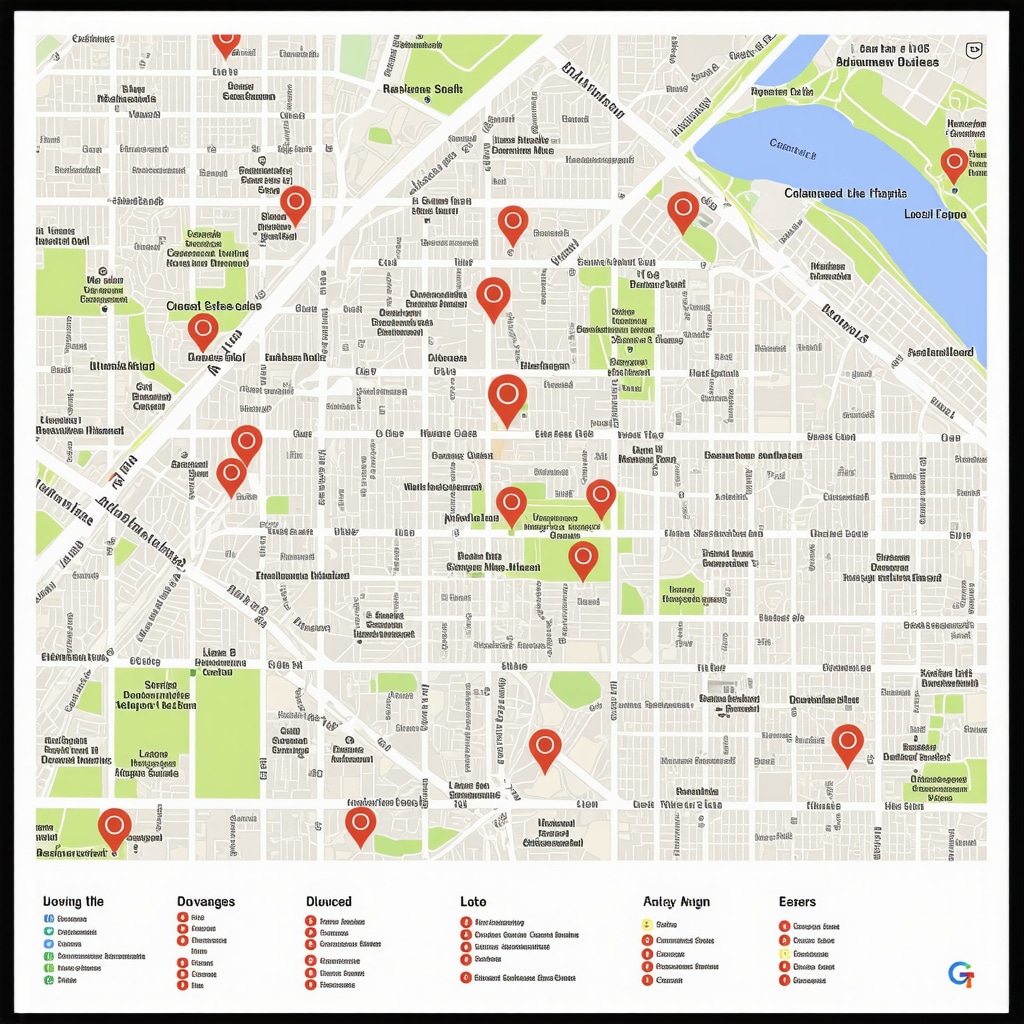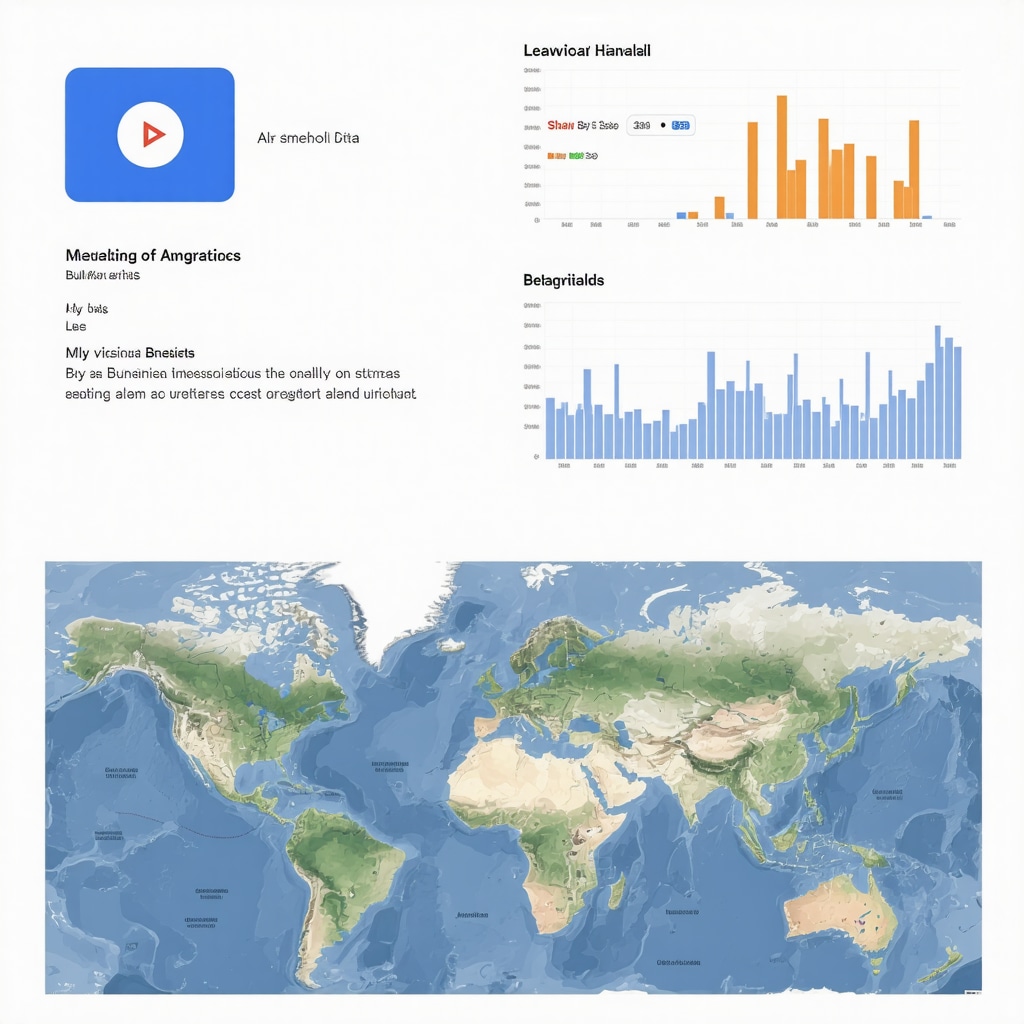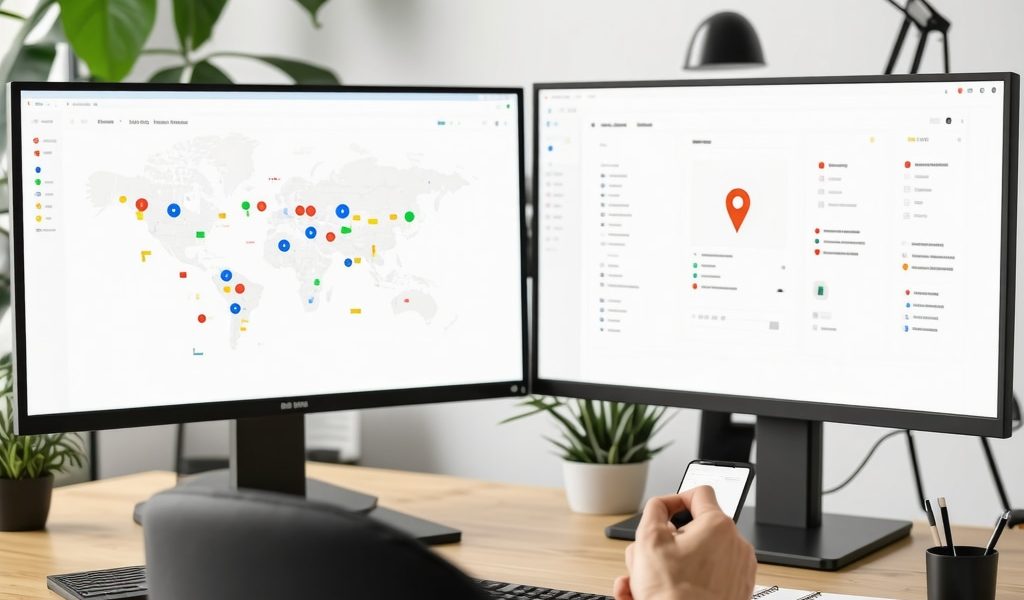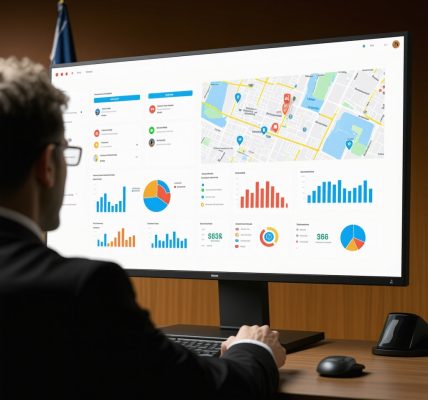Unlocking the Power of GMB Keyword Research for Local SEO Dominance
In the ever-evolving landscape of local search, mastering Google My Business (GMB) keyword research has become a pivotal strategy for businesses aiming to boost their local rankings. Unlike generic SEO tactics, effective keyword research tailored specifically for GMB listings can dramatically enhance your visibility in Google’s local 3-pack and maps results. This article dives deep into sophisticated approaches that leverage GMB keyword insights to propel your business above competitors in local search results.
Decoding User Intent: The Secret Ingredient in GMB Keyword Strategy
Understanding the nuances of user intent behind local search queries is essential. Customers searching for services like “best Italian restaurant near me” or “emergency plumber in downtown” expect immediate relevance and proximity. By researching keywords that reflect transactional and navigational intent, you align your GMB profile content—such as business descriptions, services, and posts—with what your audience truly seeks. Tools like Google’s Keyword Planner and specialized local SEO platforms help identify high-impact keywords that resonate with your target market’s search behavior.
How Can Strategic GMB Keyword Research Elevate My Local Ranking?
Strategic keyword research for GMB goes beyond stuffing keywords; it involves integrating contextually relevant terms into your business description, services, and frequently updated posts. For example, a landscaping company targeting “sustainable garden design” can optimize their GMB by including this phrase naturally in their profile and posts, attracting niche local traffic. Furthermore, consistent incorporation of geo-modifiers—like neighborhood names or landmarks—enhances hyperlocal relevancy, a crucial factor in Google’s local algorithm. This approach not only improves rankings but also increases qualified leads who are ready to convert.
Harnessing Latent Semantic Indexing (LSI) Keywords for GMB Profiles
Latent Semantic Indexing keywords complement your main keywords by covering related concepts and synonyms that Google associates with your business category. For instance, a “coffee shop” might include terms such as “espresso bar,” “local café,” or “artisan coffee” in their GMB content. This semantic richness signals to Google a comprehensive understanding of the business niche, helping to capture diverse search queries. Incorporating LSI keywords naturally within your GMB description and updates fosters broader local discovery without risking keyword stuffing penalties.
Real-World Application: A Case Study in GMB Keyword Optimization
Consider a boutique fitness studio aiming to increase local foot traffic. By analyzing competitor GMB profiles and local search trends, they identified keywords like “HIIT classes in [City],” “personal training near me,” and “small group fitness sessions.” Optimizing their business description and regularly publishing posts featuring these keywords alongside client testimonials and promotions led to a 35% increase in local search impressions within three months. This practical example underscores how targeted keyword research and content alignment can translate into measurable visibility gains.
Ready to Transform Your Local Visibility? Engage and Share!
If you’re eager to elevate your Google My Business rankings through expert keyword research and tailored optimization strategies, share your experiences or questions below. Engaging with a community focused on local SEO can unlock new insights and opportunities. For an in-depth exploration of how to optimize your Google Business Profile effectively, explore our comprehensive guide here.
For further authoritative insights on local SEO, the Moz Local SEO Guide offers a profound foundation on optimizing for local search success.
Fine-Tuning Your GMB Content with Customer Language
One insight I’ve gathered over the years is the power of mirroring the exact words your customers use when searching for your services. It’s not just about what you think sounds professional or sounds like a perfect descriptor; it’s about what your potential customers type into Google. I remember optimizing a small bakery’s GMB profile where the owner initially described their offerings with industry jargon like “artisan pastries” and “gourmet confections.” While those phrases were accurate, the traffic didn’t surge as expected. After diving into actual search queries, we incorporated more common terms like “fresh cupcakes near me” and “birthday cakes in [Neighborhood],” which resonated more with local searchers. The result? A noticeable uptick in calls and foot traffic within weeks.
Leveraging User-Generated Content and Reviews to Capture New Keywords
Another layer I found invaluable is mining customer reviews for keyword opportunities. Reviews often highlight features or services in the customers’ own words, offering a treasure trove of natural language that can enhance your GMB profile’s relevance. For example, a local spa I worked with received reviews mentioning “deep tissue massage” and “relaxing aromatherapy sessions.” By strategically incorporating these phrases into their GMB posts and descriptions, the spa expanded its local reach significantly. This aligns with findings from Search Engine Land, which discusses how user-generated content can influence local SEO rankings.
How Do You Balance Keyword Optimization Without Losing Authenticity?
This is a question I often ask myself and clients because the line between effective optimization and sounding robotic can be thin. Authenticity matters tremendously, especially in local business profiles where trust is key. My approach is to weave keywords naturally into storytelling—whether that’s through your business description, posts, or responses to reviews. Think of it as a conversation with your future customer rather than a checklist for search engines. That balance has helped me maintain engaging profiles that both rank well and appeal genuinely to users.
Why Consistent Updates Amplify Keyword Effectiveness
I’ve noticed that businesses who regularly update their GMB listings with posts, offers, and new photos see better traction with their keyword strategies. Updating your profile keeps Google’s algorithm engaged and signals that your business is active and relevant. Plus, each new post or update is another chance to highlight different keywords and services, casting a wider net for local searchers. If you want to dive deeper into effective Google Business listing updates, check out this detailed guide on how to improve your Google Business Rank with weekly profile updates.
Exploring Geo-Targeting Beyond Just City Names
When I first started optimizing GMB profiles, I mainly focused on including city names as geo-modifiers. Over time, I realized adding neighborhood names, landmarks, and even street names can make a huge difference, especially in competitive markets. For example, a coffee shop in downtown Seattle gained more local visitors after optimizing for keywords like “coffee near Pike Place Market” or “espresso bar on 1st Avenue.” This hyperlocal approach refines your visibility to exactly the people looking for services in very specific parts of town. It’s a subtle but powerful tactic many overlook.
For a comprehensive dive into hyperlocal SEO tactics that can complement your GMB keyword research, explore this Google Maps SEO 2025 guide.
Unlocking the Nuances of Hyperlocal Geo-Modifiers: Beyond Traditional City Targeting
While city-level geo-targeting remains a foundational element in local SEO, truly expert GMB keyword strategies delve deeper into hyperlocal modifiers that capture micro-moments of intent. Consider integrating neighborhood names, key landmarks, street addresses, and even colloquial local terms that residents use. This approach not only narrows competition but also aligns your listing with ultra-specific search queries such as “vegan bakery in Capitol Hill” or “emergency locksmith near Union Square.” The granularity of this targeting signals to Google’s local algorithm that your business is an authoritative presence in those precise locales, boosting your chances of appearing in the coveted local 3-pack for very relevant searches.
Harnessing the Power of Behavioral Data to Refine Keyword Targeting in GMB
Elevating your GMB keyword research involves integrating behavioral analytics from tools like Google Analytics and Google Search Console alongside GMB Insights. Tracking search queries that lead users to your profile, click-through rates on specific keywords, and user engagement metrics provides a feedback loop to refine your keyword incorporation. For example, if “organic skincare products near me” drives significant profile visits but lacks direct keyword mention in your description, strategically weaving this phrase can increase conversion likelihood. This data-driven refinement ensures your profile evolves in tandem with shifting consumer behaviors and search trends.
Can Latent Semantic Indexing (LSI) Keywords and Geo-Modifiers Be Combined Effectively in GMB?
Absolutely. Combining LSI keywords with hyperlocal geo-modifiers creates a semantic-rich and contextually precise GMB profile that outperforms generic keyword stuffing. For instance, a boutique hotel could use LSI terms like “luxury accommodations,” “boutique lodging,” and “guesthouse” alongside geo-specific modifiers such as “near Central Park” or “in SoHo neighborhood.” This layered approach captures diverse user intents and search patterns, enhancing your profile’s relevance across a spectrum of queries. However, the integration must be seamless and natural to maintain authenticity and avoid penalties.
Recent studies by Search Engine Land affirm that semantic keyword variety combined with precise geo-targeting can elevate local search rankings significantly, especially in competitive urban markets.
Innovative Content Strategies: Leveraging GMB Posts and Q&A to Embed Keywords Organically
Beyond static descriptions, GMB posts and the Q&A section offer dynamic platforms to embed targeted keywords while engaging potential customers authentically. Craft posts around promotions, events, or FAQs using natural language that incorporates your researched keywords and geo-modifiers. For example, a local pet groomer might publish a post titled “Spring Grooming Specials in Downtown Austin” that naturally includes phrases like “affordable pet grooming near Zilker Park.” Similarly, responding to customer questions with keyword-rich, helpful answers enhances keyword saturation and builds trust. These content touchpoints not only refresh your profile frequently, signaling activity to Google, but also expand keyword footprint without redundancy.

Expert Tip: Mapping Keyword Strategies to Customer Journey Stages in GMB
Effective GMB keyword optimization recognizes distinct customer journey phases—awareness, consideration, and decision—and tailors keyword usage accordingly. During awareness, broader, informational keywords such as “what is sustainable landscaping?” can be included in posts or FAQs. In consideration, more specific terms like “sustainable garden design services in [Neighborhood]” guide prospects evaluating options. Finally, decision-stage keywords such as “book sustainable landscaping consultation near me” drive conversions. This strategic alignment ensures your profile connects meaningfully at each touchpoint, maximizing lead generation.
If you’re ready to dive deeper into these advanced GMB keyword tactics and elevate your local SEO strategy to expert levels, explore our detailed resources and case studies, or reach out to our team of local SEO specialists for personalized guidance.
Integrating Behavioral Analytics for Precision GMB Keyword Optimization
To transcend conventional keyword research, harnessing behavioral analytics data from platforms like Google Analytics and Search Console is indispensable. These tools illuminate the actual search queries driving traffic to your Google My Business profile and reveal user engagement patterns, enabling a data-driven refinement of your keyword strategy. For example, if “organic skincare products near me” consistently generates profile visits but remains underrepresented in your content, deliberately weaving this phrase can markedly improve conversion rates. This iterative feedback loop ensures your GMB listing remains agile and responsive to evolving consumer search behaviors and intent.
Semantic Geo-Targeting: Fusing LSI Keywords with Hyperlocal Modifiers
Marrying Latent Semantic Indexing (LSI) keywords with granular geo-modifiers elevates your GMB profile’s contextual relevance and competitive edge. Consider a boutique hotel employing LSI terms such as “luxury accommodations” and “guesthouse” alongside precise geo-targeting like “near Central Park” or “in SoHo neighborhood.” This layered semantic and geographic targeting captures a broader spectrum of user intents, enhancing visibility in hypercompetitive urban landscapes. The key lies in seamlessly integrating these elements to maintain authenticity and avoid keyword stuffing, thereby satisfying both user expectations and search engine algorithms.
What Are the Best Practices for Leveraging GMB Posts and Q&A Sections to Amplify Keyword Impact?
GMB posts and the Q&A section serve as dynamic canvases for embedding targeted keywords organically while fostering user engagement. Crafting posts around timely promotions, events, or frequently asked questions allows natural inclusion of researched keywords and geo-modifiers. For instance, a pet groomer might post “Spring Grooming Specials in Downtown Austin,” incorporating phrases like “affordable pet grooming near Zilker Park.” Furthermore, responding thoughtfully to customer questions with keyword-rich yet genuine answers not only enriches the keyword landscape but also builds trust and authority. Regularly updating these sections signals business activity to Google, amplifying your local SEO efforts without redundancy.

Authoritative Insights: Leveraging Semantic SEO and Geo-Targeting Synergies
According to a comprehensive analysis by Search Engine Land, the confluence of semantic keyword diversity and precise geo-targeting is a critical factor in elevating local search rankings, particularly in complex urban markets. Their research underscores that businesses adopting this nuanced approach consistently outperform competitors relying solely on traditional city-level keywords, validating the strategic value of integrating LSI and hyperlocal modifiers.
Engage with Cutting-Edge GMB Keyword Techniques
Are you ready to refine your GMB keyword strategy with data-driven behavioral insights and sophisticated semantic geo-targeting? Connect with our local SEO experts to explore personalized optimization plans and access advanced resources designed to boost your local search dominance. Share your experiences or questions below and join a community committed to mastering Google My Business optimization at an expert level.
Frequently Asked Questions (FAQ)
What is Google My Business (GMB) keyword research, and why is it important for local SEO?
GMB keyword research involves identifying and integrating search terms that potential local customers use when looking for products or services related to your business on Google Maps and local search results. It is crucial because optimizing your GMB profile with these keywords improves your visibility in Google’s local 3-pack and map listings, directly impacting foot traffic and local conversions.
How do Latent Semantic Indexing (LSI) keywords enhance my GMB profile?
LSI keywords are conceptually related terms and synonyms that complement your primary keywords. Incorporating LSI keywords naturally in your GMB description and posts signals to Google a broader and deeper relevance of your business niche, helping you capture diverse search queries without keyword stuffing and improving your local search ranking.
Can I use neighborhood names or landmarks instead of just city names in my GMB keywords?
Yes. Hyperlocal geo-modifiers such as neighborhoods, landmarks, and street names refine your local targeting beyond city-level terms. This nuanced approach aligns your business with specific local search intents, decreases competition, and increases the likelihood of appearing for highly relevant, location-specific queries.
How can customer reviews help improve my GMB keyword strategy?
Customer reviews often contain natural language and keywords your audience uses. By analyzing reviews, you can identify common phrases and services mentioned by customers and strategically incorporate these into your GMB profile content, posts, and responses, enhancing authenticity and keyword relevance.
What is the best way to balance keyword optimization with maintaining an authentic voice on my GMB profile?
Authenticity is key in local SEO. Instead of keyword stuffing, weave keywords organically through storytelling, genuine responses to reviews, and natural language in posts. Think of your GMB profile as a conversation with potential customers rather than a search engine checklist, which fosters trust while still benefiting SEO.
Why are regular updates important for GMB keyword effectiveness?
Consistent updates such as posts, new photos, and offers keep your GMB profile active and signal relevance to Google’s algorithm. Each update is an opportunity to highlight different keywords and services, broadening your keyword footprint and improving your chances of ranking higher in local search results.
How can I use behavioral analytics to improve my GMB keyword targeting?
Tools like Google Analytics, Search Console, and GMB Insights provide data on which search queries drive traffic and user engagement patterns. This behavioral data allows you to refine and update your keyword integration based on real user intent and performance, ensuring your GMB profile stays aligned with evolving search trends.
Are GMB posts and Q&A sections effective for keyword embedding?
Absolutely. GMB posts and Q&A provide dynamic, natural platforms to include targeted keywords and geo-modifiers while engaging users authentically. Regularly crafting keyword-rich, relevant content in these areas enhances your local SEO footprint and signals active business engagement to Google.
How do I map keywords to different stages of the customer journey in GMB?
Effective GMB keyword strategies align keywords with the customer journey phases: awareness (informational keywords), consideration (specific service-related keywords), and decision (conversion-driven keywords). Tailoring content and keywords to these stages ensures your profile connects meaningfully with prospects at each touchpoint, maximizing lead generation.
Can combining LSI keywords with hyperlocal geo-modifiers boost my local rankings?
Yes. Layering semantic keywords with precise geo-targeting creates a rich, contextually relevant profile that captures a wide array of search intents. This combined approach improves your profile’s authority and visibility in competitive urban markets, provided the integration remains natural and authentic.
Trusted External Sources
- Moz Local SEO Guide – A comprehensive resource offering foundational and advanced strategies for optimizing local SEO, including GMB keyword research and profile management.
- Search Engine Land – Google Local SEO Optimization Guide – Provides expert analyses and up-to-date insights on semantic SEO, geo-targeting, and local search algorithm updates critical for mastering GMB optimization.
- Google My Business Help Center – The official Google resource detailing best practices, features, and updates directly related to managing and optimizing GMB profiles effectively.
- BrightLocal Local Consumer Review Survey – Offers valuable data on the impact of reviews and user-generated content on local search behavior, informing strategies for leveraging reviews in keyword research.
- Google Search Console & Analytics Documentation – Essential for understanding how to interpret behavioral data that informs GMB keyword refinement and performance tracking.
Conclusion
Mastering Google My Business keyword research is a nuanced, dynamic process that blends semantic understanding, hyperlocal geo-targeting, and data-driven behavioral insights to maximize local search visibility. By strategically integrating primary keywords, LSI terms, and precise geo-modifiers throughout your GMB profile and content, you create a compelling, authentic presence that resonates with both Google’s algorithms and your local audience. Regular updates, leveraging customer language from reviews, and mapping keywords to customer journey stages further elevate your profile’s relevance and conversion potential. Embracing these expert strategies enables businesses to dominate local search results and attract highly qualified leads ready to engage.
Ready to elevate your local SEO mastery? Share your experiences in the comments, explore our advanced guides, or connect with local SEO experts to tailor your GMB keyword strategy for maximum impact.



